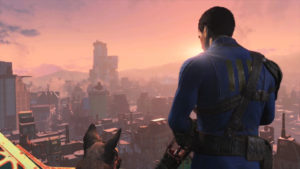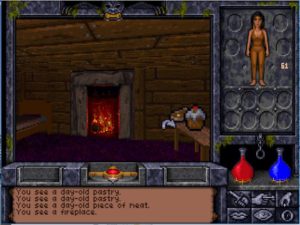At What Cost Survival?
Posted by Rampant Coyote on July 25, 2016
 Okay, depending on the game, I like survival mechanics. It’s a not-insignificant part of why I love the Ultima Underworld series so much. Maybe there’s an effective Maslow’s Hierarchy for RPGs or something, but having that base level struggle, particularly at the beginning, can be pretty fun.
Okay, depending on the game, I like survival mechanics. It’s a not-insignificant part of why I love the Ultima Underworld series so much. Maybe there’s an effective Maslow’s Hierarchy for RPGs or something, but having that base level struggle, particularly at the beginning, can be pretty fun.
It’s becoming more common lately. I think this is because of the rise of indie games, and the sad fact that it can be used to help “pad out” limited content. That, and perhaps an effort to recapture the lightning-in-a-bottle that was Minecraft. Or maybe it’s just because it is something that seems to go naturally with zombies. But I will also allow that there are simply a lot of indie game designers out there who, like me, enjoy the survival mechanics.
Maybe they enjoy them a lot more than me. That, or they are really desperate to pad out the content. Because there’s a certain point where the amount of maintenance effort needed to survive really overshadows everything else in the game. Assuming there is much more to the game, of course. In other words, there’s definitely a point where there’s too much of a good thing.
 I’m not sure exactly where that sweet spot is. Minecraft hit pretty close, in my opinion. Ultima Underworld perhaps had too light of a touch, overall, but it was still enough to make it interesting. Empyrion – Galactic Survival, even though that’s in its title and thus can probably be considered mostly a survival game, is more than a little overwhelming.
I’m not sure exactly where that sweet spot is. Minecraft hit pretty close, in my opinion. Ultima Underworld perhaps had too light of a touch, overall, but it was still enough to make it interesting. Empyrion – Galactic Survival, even though that’s in its title and thus can probably be considered mostly a survival game, is more than a little overwhelming.
Maslow’s pyramid sets physical needs as the basic elements that form the foundation. This includes food, water, air, and protection from the elements. The next level is safety. In many survival-oriented games, that’s as often as not a bolt-hole from enemies. After that… well, after that, the game-worlds will have somewhat different analogs to the real world.
Minecraft captured this in the critical “first day” experience (in survival mode)… you start out at full health and fully satiated. The base physical needs are not in jeopardy, so you are free to work on the next stage of the hierarchy – safety. Inevitably, you don’t have enough time to do a great job of it before nightfall and the monsters come out. Plus, you have to be thinking ahead as to where you’ll get your next meal from. You may be fine for about 24 hours of game time, but after that you are going to need food somehow.
For me, the way I play, the basics are generally reasonably covered by the third day. I have food (if not much variety), a safe location that’s expanding and undergoing aesthetic improvements, and I’m into a regular cycle of exploring and then converting the explored territory into somewhat safe locations. I’m primarily exploring, fighting, and conquering, with some safety-building and occasional efforts to harvest / improve my food sources.
(Interestingly, Minecraft also adds an additional level of the pyramid, perhaps just above safety… illumination. You spend most of the game in darkness, either at night or down below ground. You can technically still get around in darkness, but it’s very difficult, and can be dangerous. Creatures won’t spawn in well-lit places, and they are much easier to see and fight when they move into the light.)
I suspect that it really comes down to good ol’ fashioned variety. It’s absolutely fine for a game to start you out at the bottom of the hierarchy and have you scavenging for the basics. And it’s good to have that element never entirely go away. But there’s a certain point where at least a chunk of those basics really do have to become automated or self-sustaining so the player can really make progress forward into other areas without constantly needing to make sure he or she isn’t going to run out of critical resources on the way.
Or, perhaps another way of putting it… maintenance costs (in terms of player time / effort) should drop considerably at each stage of the game. Maybe not perfectly or consistently… it’s fine to have to deal with the occasional emergency like an enemy attack to your supplies or production chain. But otherwise, progress should be the ability to pay less and less attention to those lower levels of survival.
Filed Under: Design - Comments: Comments are off for this article